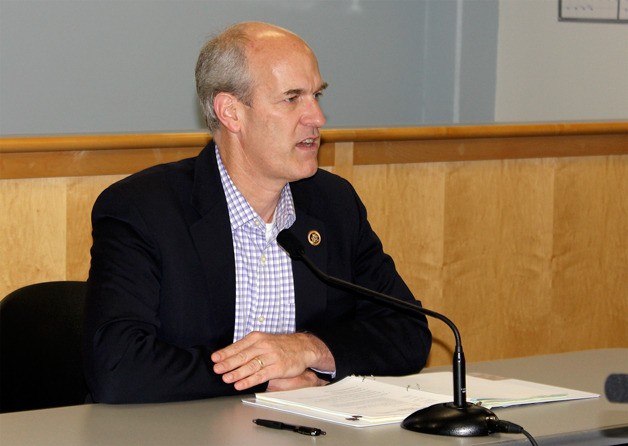Roads, bridges, highways, ferries — all are essential for the economic health of the state and Island County, and Congress needs to pass a long-term bill to pay for critical infrastructure, Congressman Rick Larsen told county officials this week.
The Second District Democrat visited Coupeville Wednesday to talk with Island County leaders about transportation needs for the area and to tout a $478 billion, six-year transportation proposal floated by the White House.
The Grow America Act would provide more money and a steady source of revenue for highways, bridges, transit and rail systems. It’s paid for by supplementing revenue from the federal Highway Trust Fund and taxing corporate overseas profit. Larsen helped introduce the bill earlier this year.
Most of the federal money for transportation projects comes from the Highway Trust Fund. At the end of this month the authorization to spend from that fund will expire.
Lawmakers largely disregarded the last version of the act and instead opted for a temporary extension of highway spending. This time around, Larsen would like a predictable, long-term funding source for transportation.
“Without that predictable investment we are in danger of slamming the brakes on our economy,” he said.
The proposal includes $7.5 billion for the TIGER grant program, which provides money for capital projects to public entities that usually have limited access to federal support.
Larsen introduced a bill called TIGER CUBS designed to help medium-sized cities land the dollars to repair and build roads, and he said he’s working to add it to the transportation bill. Small and large communities tend to have an easier time getting federal dollars, but mid-sized towns often get left to fend for themselves.
“If you are in the middle band of communities, you need to nickel and dime to get enough money to get a project going,” he said. “The TIGER program fills in that middle band.”
County officials present included county commissioners, the Coupeville Chamber of Commerce, Island Transit and the mayor of Langley. Larsen invited officials to bring their questions and concerns to the table.
Ferry issues were a big concern of county commissioners. The U.S. has six major public ferry systems and Washington’s is the largest with 23 million riders last year, according to agency statistics. Ferries are part of the state highway system and serve as a vital transportation link for many who travel to work, school and other services, but Larsen acknowledged that other lawmakers sometimes view ferries as merely a tourist activity.
“The perception is that it’s not part of our transportation system,” he said. “That it’s a fun ride.”
In Island County, ferries are critical and more needs to be done to create links with other forms of transportation, said Commissioner Jill Johnson.
She also expressed concern about the cost of ferries and wait times.
“People don’t want to wait two hours or more to catch a boat,” she said.
She also expressed concern about the geographic challenges of a county made up of two islands separated by another county.
That presents unique challenges for residents trying to access services.
Commissioner Helen Price Johnson also asked the visiting congressman about ferries, specifically addressing the state’s project to replace the dock in Mukilteo. It has plans for overhead boarding for walk-on passengers, but nothing is in the works for Clinton. That could be confusing for riders, she said.
Langley Mayor Fred McCarthy was also present at the meeting, and though he didn’t speak he felt the board’s ferry-related questions represented the issues facing Whidbey Island well, particularly the differences between investments in Mukilteo and Clinton.
“I think it’s a legitimate concern,” he said.



